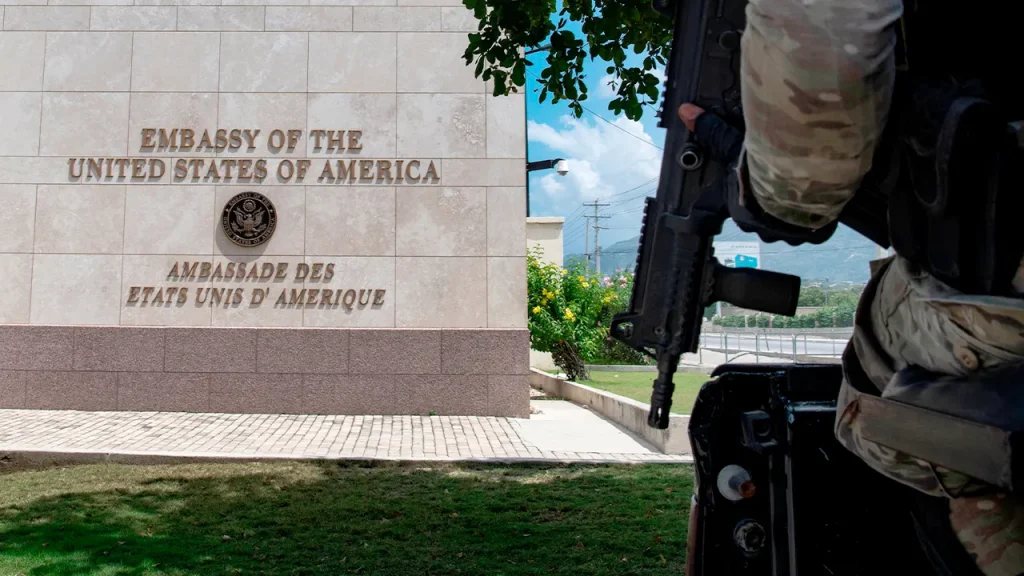Marines Exchange Gunfire with Suspected Gang Members at US Embassy in Haiti
In a tense confrontation highlighting Haiti’s deteriorating security situation, U.S. Marines stationed at the American embassy in Port-au-Prince exchanged gunfire with suspected gang members on November 13. Marine Captain Steven J. Keenan confirmed the incident, stating that embassy security personnel responded professionally after being fired upon. “U.S. Marines are committed to the safety and security of U.S. embassies worldwide and respond to all threats with professionalism and swift, disciplined action,” Keenan explained in a statement to Fox News Digital. Fortunately, no service members sustained injuries during the exchange, though the incident underscores the volatile environment surrounding diplomatic operations in Haiti’s capital. This confrontation represents just one moment in the broader security challenges facing foreign personnel in a nation where armed groups have established control over significant portions of urban areas, threatening both locals and international presence alike.
The gunfire exchange occurs against the backdrop of a nation in crisis, with Haiti experiencing a power vacuum since the 2021 assassination of President Jovenel Moïse. No elected government has filled this void, creating conditions where armed gangs have flourished and expanded their influence. According to United Nations assessments, these criminal organizations now control approximately 90% of Port-au-Prince, effectively paralizing normal civic functions through systematic violence and intimidation. Their tactics include blocking critical access roads, attacking essential infrastructure, and employing terror through kidnappings, sexual violence, and killings. The absence of effective governance has allowed these groups to operate with relative impunity, turning everyday life for Haitians into a constant navigation of danger zones and threatening the operations of international organizations attempting to provide humanitarian assistance.
In response to this deteriorating situation, the United Nations authorized a multinational security mission scheduled to begin operations on October 2. This specialized gang suppression force of 5,550 personnel is designed to work alongside what remains of Haiti’s national authorities to neutralize gang activity, secure critical infrastructure, and support humanitarian access throughout the country. The mission represents an international recognition of Haiti’s inability to independently address the security crisis and aims to “protect vulnerable populations from escalating violence and prevent the displacement that inevitably causes.” However, questions remain about the mission’s effectiveness, as specific contributing nations have not been fully identified, though funding is expected to come from voluntary contributions by UN member states. The complexity of Haiti’s security challenges suggests that even with international support, restoring stability will likely require sustained effort beyond immediate military intervention.
The security environment has become so precarious that the U.S. State Department maintains its most severe advisory for Haiti—”Level 4: Do Not Travel”—warning Americans of the extreme risks of kidnapping, crime, terrorist activity, and civil unrest. In July 2023, the deteriorating conditions prompted American authorities to order all non-emergency government employees and their family members to evacuate the country. This directive preceded the March 2024 declaration of a state of emergency in Haiti, which remains in effect as gang violence continues unabated. The travel warning and evacuation orders reflect the reality that even routine travel within the country carries substantial risk, particularly in urban areas where territorial control shifts frequently between rival armed groups. For ordinary Haitians without the option to leave, these conditions have created a humanitarian crisis with limited access to essential services, including healthcare, education, and even basic necessities like food and clean water.
The impact of Haiti’s security crisis extends beyond its borders, affecting regional commerce and tourism in the Caribbean. Major cruise lines have suspended visits to Haitian destinations due to kidnapping risks and general safety concerns, further damaging the country’s struggling economy that heavily depends on tourism revenue. This economic isolation compounds the humanitarian challenges, creating a vicious cycle where lack of economic opportunity drives more young men into gang membership. Meanwhile, the U.S. military has increased its presence in the Caribbean region, with bombers, Marines, and warships converging near Venezuela, though this buildup appears more directed at regional geopolitical concerns than specifically addressing Haiti’s crisis. Nevertheless, the American military presence provides additional resources that could potentially support evacuation operations or humanitarian assistance if the situation in Haiti further deteriorates.
The exchange of gunfire between Marines and suspected gang members at the U.S. Embassy represents a microcosm of Haiti’s broader tragedy—a nation where violence has become normalized and institutions have collapsed under the weight of political instability, corruption, and external pressures. While international efforts to restore security continue, including the UN-authorized multinational force, the path toward sustainable peace remains unclear. The Haitian people, caught between armed gangs, ineffective governance, and insufficient international support, continue to bear the heaviest burden of this protracted crisis. As Captain Keenan’s statement indicates, the Marines remain committed to their mission of protecting American diplomatic personnel, but this incident serves as a stark reminder that Haiti’s challenges require comprehensive solutions beyond security measures alone—including political reconciliation, economic development, and strengthened institutions capable of delivering essential services to a population that has endured far too much suffering in recent years.


